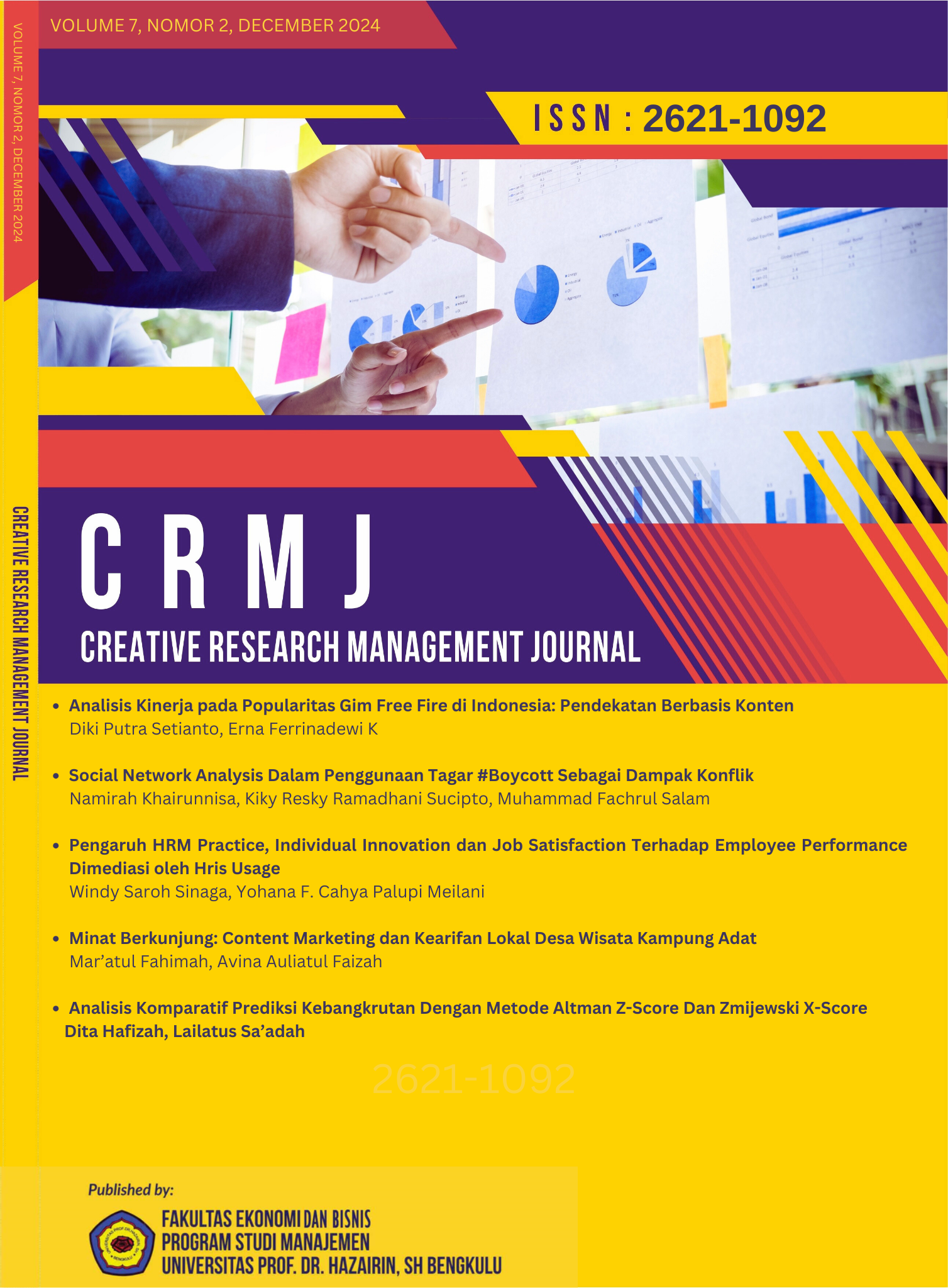PENGARUH HRM PRACTICE, INDIVIDUAL INNOVATION DAN JOB SATISFACTION TERHADAP EMPLOYEE PERFORMANCE DIMEDIASI OLEH HRIS USAGE
DOI:
https://doi.org/10.32663/6kn0x276Kata Kunci:
Human Resource Management Practice, Individual Innovation Capability, Job Satisfaction, HRIS USAGE, Employee PerformanceAbstrak
This study aims to determine the effect of human resource management practices, individual innovation capability, and job satisfaction on employee performance, with HRIS usage as a mediator. A cross-sectional method was used to obtain quantitative data through an online questionnaire, adapted from existing questions in previous literature. Data were collected from all members of the target population, consisting of 69 non-managerial HR division employees at private company XYZ, who had worked for at least one year, using a census or saturation sampling technique. The data were then analyzed using PLS-SEM software. The results showed a significant relationship between human resource management practices, individual innovation capability, job satisfaction, and HRIS USAGE on employee performance. However, HRIS USAGE did not mediate the relationship between human resource management practices, individual innovation capability, job satisfaction, and employee performance among HR division employees at private company XYZ. This study was only empirically tested within the HR division using saturated sampling or a census approach, resulting in limitations in the generalizability of the findings. These findings offer managerial implications that can help private company XYZ improve employee performance.
Referensi
Adiguzel, Z., Ozcinar, M. F., & Karadal, H. (2020). Does servant leadership moderate the link between strategic human resource management on rule breaking and job satisfaction? European Research on Management and Business Economics, 26(2), 103–110. https://doi.org/10.1016/j.iedeen.2020.04.002
Alsafadi, Y., & Altahat, S. (2021). Human Resource Management Practices and Employee Performance: The Role of Job Satisfaction. Journal of Asian Finance, Economics and Business, 8(1), 519–529. https://doi.org/10.13106/jafeb.2021.vol8.no1.519
Amina Musa, A., Dutse, A. Y., & Ahmad, A. (2023). Effect of Human Resource Management Practice on Employee Performance in Bauchi Local Government Area. Journal Of Science Technology And Education, 11(3).
Ben Moussa, N., & El Arbi, R. (2020). The impact of Human Resources Information Systems on individual innovation capability in Tunisian companies: The moderating role of affective commitment. European Research on Management and Business Economics, 26(1), 18–25. https://doi.org/10.1016/j.iedeen.2019.12.001
Bhaskar, A., & Mohanasundaram, D. A. (2019). Hris-An Effective Tool for Better Job Satisfaction. Iconic Research and Engineering Journals, 3(2), 325–328.
Bougie, R., & Sekaran, U. (2020). Research methods for business: A skill building approach (8th ed.). Wiley & Sons Ltd.
Chuan Terng, L., & Ahmad, N. (2021). The Relationship Between Human Resource Management Practices and Employee Performance. Research In Management Of Technology And Business, 2(1), 123–136. http://publisher.uthm.edu.my/periodicals/index.php/rmtb
Elia Salsabila, D., Askolani, & Rofaida, R. (2024). The Mediating Role of Job Satisfaction in the Relationship between Human Resource Information System and Employee Performance at The Project Deployment Center Division of PT Len Industri (Persero). The International Journal of Business Review, 17(2). https://doi.org/10.17509/tjr.v
Hair, J. F., Risher, J. J., Sarstedt, M., & Ringle, C. M. (2019). When to use and how to report the results of PLS-SEM. European Business Review, 31(1), 2–24. https://doi.org/10.1108/EBR-11-2018-0203
Jadesola Ololade, A., Odunayo Paul, S., Tolulope Morenike, A., & Augustina Esitse, D. (2023). Bolstering the role of human resource information system on employees’ behavioural outcomes of selected manufacturing firms in Nigeria. Heliyon, 9(1), e12785. https://doi.org/10.1016/j.heliyon.2022.e12785
Khan, M., Raya, R. P., & Viswanathan, R. (2022). Enhancing employee innovativeness and job performance through a culture of workplace innovation. International Journal of Productivity and Performance Management, 71(8), 3179–3204. https://doi.org/10.1108/IJPPM-09-2020-0466
Magableh, A. N., & Al-Tarawneh, J. T. (2021). The Effect of Information Systems for Human Resources on the Capability of Individual Innovation in Jordanian Companies: A Conceptual Review. In Studies in Computational Intelligence (Vol. 974). Springer International Publishing. https://doi.org/10.1007/978-3-030-73057-4_30
Memon, M., Ting, H., Cheah, J.-H., Thurasamy, R., Chuah, F., & Huei Cham, T. (2020). Journal of Applied Structural Equation Modeling SAMPLE SIZE FOR SURVEY RESEARCH: REVIEW AND RECOMMENDATIONS. Journal of Applied Structural Equation Modeling, 4(2), 2590–4221.
Nguyen, D. T., Ha, V. D., & Dang, T. T. N. (2020). The impact of human resource management activities on the compatibility and work results. Journal of Asian Finance, Economics and Business, 7(9), 621–629. https://doi.org/10.13106/JAFEB.2020.VOL7.NO9.621
Nyathi, M., & Kekwaletswe, R. (2024). Electronic human resource management (e-HRM) configuration for organizational success: inclusion of employee outcomes as contextual variables. Journal of Organizational Effectiveness, 11(1), 196–212. https://doi.org/10.1108/JOEPP-08-2022-0237
Pasulu, M., Irfan, A., Pahmi, P., Alim, A., & Thalib, L. (2023). The Effect of Job Satisfaction and Work Motivation on Employee Performance through Work Discipline at the Regional Secretariat of East Luwu Regency, Indonesia. Account and Financial Management Journal, 08(07). https://doi.org/10.47191/afmj/v8i7.01
Pratiwi, E. C., Herdajanto, T., Budiyanto, F., Fitriyani, Z. A., Rahmawati, U., & Sjachriatin, E. (2023). The Role of Knowledge Sharing, Job Involment and Individual Innovation Capability on Employee Performance at PT. Bhirowo Jaya Mojokerto. IJEBD (International Journal of Entrepreneurship and Business Development), 6(1), 93–101. https://doi.org/10.29138/ijebd.v6i1.2155
Purwadi, Darma, D.C., Febrianti, W., Mirwansyah, D. (2020). Exploration of Leadership, Organizational Culture, Job Satisfaction, and Employee Performance. Technium Social Sciences Journal, 6(2020), 116-130. http://dx.doi.org/10.47577/tssj.v6i1.242
Riyanto, S., Endri, E., & Herlisha, N. (2021). Effect of work motivation and job satisfaction on employee performance: Mediating role of employee engagement. Problems and Perspectives in Management, 19(3), 162–174. https://doi.org/10.21511/ppm.19(3).2021.14
Rodjam, C., Thanasrisuebwong, A., Suphuan, T., & Charoenboon, P. (2020). Effect of human resource management practices on employee performance mediating by employee job satisfaction. Systematic Reviews in Pharmacy, 11(3), 37–47. https://doi.org/10.5530/srp.2020.3.05
Sugiyono. (2014). Metode Penelitian Pendidikan (Pendekatan Kuantitatif, Kualitatif dan R&D). Alfabeta.
Yang, S., & Wu, H. (2021). The Performance Impact of New Ventures in Working Environment and Innovation Behavior From the Perspective of Personality Psychology. Frontiers in Psychology, 12(November), 1–11. https://doi.org/10.3389/fpsyg.2021.734014
Yona, F., & Meilani, Y. F. C. P. (2024). The Impact of The HRIS Usage in Human Resource Management Practice, Employee Innovation, and Job Satisfaction to Increase Employee Performance. Quantitative Economics and Management Studies, 5(4), 815–831.
Unduhan
Diterbitkan
Terbitan
Bagian
Lisensi
Hak Cipta (c) 2024 Windy Saroh Sinaga, Yohana F. Cahya Palupi Meilani

Artikel ini berlisensi Creative Commons Attribution 4.0 International License.





